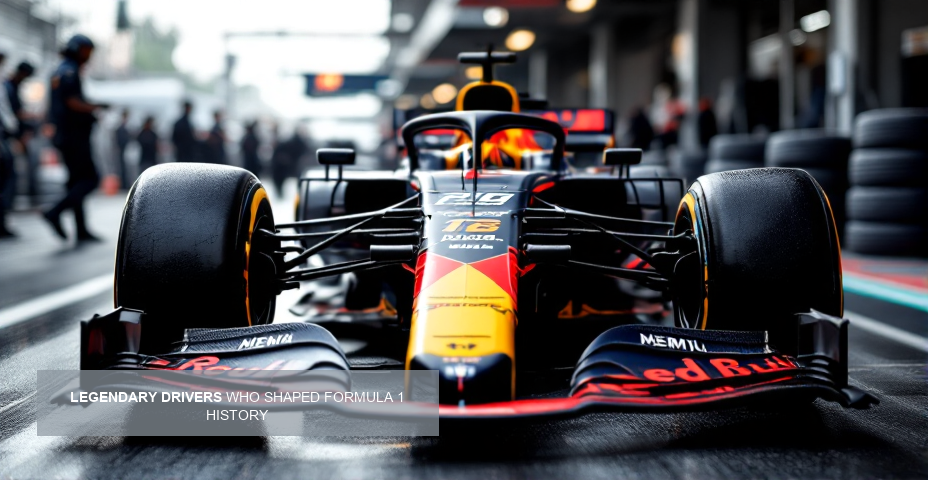In the high-octane world of Formula 1 racing, success is measured in multiple ways. Championships stand as the ultimate achievement, with race wins, podium finishes, pole positions, and fastest laps all contributing to a driver's legacy. As the sport has evolved from its inaugural 1950 season to the present day, comparing drivers across different eras presents a fascinating challenge for fans and analysts alike.
The debate around who deserves the title of best Formula 1 driver in history remains perpetually heated. Is it the driver with the most championships? The most race victories? Or perhaps the one who demonstrated exceptional skill in inferior machinery? While statistics provide a foundation for comparison, they tell only part of the story. The coming sections will examine the careers of those who have defined Formula 1 excellence, from the dominant champions with multiple titles to the phenomenal talents whose statistics perhaps do not reflect their true abilities.
Formula 1 Drivers with the Most Championships
At the pinnacle of Formula 1 achievement stand Lewis Hamilton and Michael Schumacher, both holding an unprecedented seven World Championships. Schumacher dominated the early 2000s with Ferrari, claiming five consecutive titles from 2000 to 2004, adding to his earlier successes with Benetton. His record seemed unbeatable until Hamilton emerged.
Hamilton began his championship collection with McLaren in 2008 before finding extraordinary success with Mercedes. His six championships between 2014 and 2020 demonstrated remarkable consistency across regulation changes and varying competition. What separates these two giants is their contrasting styles - Schumacher with his ruthless precision and Hamilton with his exceptional adaptability and race craft in changing conditions.
Juan Manuel Fangio: The First F1 Legend
Before the modern era, Juan Manuel Fangio set standards that remained unmatched for decades. The Argentine claimed five world championships between 1951 and 1957, an extraordinary feat considering the dangerous nature of the sport during that period. What makes Fangio's achievement even more remarkable is that he won titles with four different manufacturers - Alfa Romeo, Ferrari, Mercedes, and Maserati.
Fangio competed in just 51 Grands Prix yet won 24 of them, giving him a win percentage of 47% - a record that remains unmatched. His ability to adapt to different cars and extract maximum performance in an era without advanced technology or safety features cements his status as perhaps the most naturally gifted driver in Formula 1 history.
Multiple Championship Winners Analysis
Beyond the seven-time champions, several drivers have claimed multiple titles that demonstrate different paths to success. Sebastian Vettel secured four consecutive championships with Red Bull from 2010-2013, showcasing exceptional qualifying pace and aerodynamic mastery. Alain Prost earned four titles through intelligent race management and consistency, while Ayrton Senna captured three championships with his unmatched qualifying speed and wet-weather brilliance.
The three-time champions club includes Jack Brabham, Jackie Stewart, Niki Lauda, Nelson Piquet, and Max Verstappen, each representing different eras and racing philosophies. What connects all multiple champions is their ability to perform under pressure and adapt to changing regulations and competition - proving that sustained success in Formula 1 requires more than just raw speed.
Most Wins in Formula 1: Statistical Leaders
When examining the most successful Formula 1 drivers, total race victories provide a clear metric of dominance. The statistical leaders in Formula 1 wins have set themselves apart through exceptional skill, consistency, and longevity in the sport. While raw win totals offer one perspective, win percentages can sometimes tell a different story about driver efficiency.
Racing Legends: The Titans of Formula 1
From Schumacher's record-breaking seven championships to Hamilton's modern dominance, Formula 1 has witnessed extraordinary talent across generations. These elite drivers combined raw speed, tactical brilliance, and unwavering consistency to cement their places in motorsport history.
It is important to consider that comparing drivers across different eras presents challenges. Earlier generations competed in fewer races per season, while modern drivers benefit from more reliable machinery. Conversely, today's grid features arguably greater competitive depth. These factors must be weighed when assessing the most successful Formula 1 drivers throughout history.
Lewis Hamilton: Breaking the 100-Win Barrier
Lewis Hamilton stands alone at the summit of Formula 1 with over 100 Grand Prix victories, a milestone previously thought unattainable. His partnership with Mercedes produced an unprecedented era of success, particularly from 2014-2020. Hamilton has demonstrated remarkable adaptability across regulation changes and against various competitors.
What makes Hamilton's achievement particularly impressive is his ability to win races across 15 different seasons. His win percentage exceeds 30%, meaning he has converted nearly one-third of his race entries into victories - an extraordinary rate considering his lengthy career spanning different competitive eras.
Michael Schumacher's Dominant Ferrari Era
Michael Schumacher held the record for most Formula 1 wins before Hamilton, amassing 91 victories during his illustrious career. The German driver established his legacy primarily through his Ferrari partnership, where he won five consecutive championships between 2000-2004. During this period, Schumacher and Ferrari created perhaps the most dominant team-driver combination in F1 history.
Schumacher's win rate during his prime years was nothing short of phenomenal. In 2004 alone, he won 13 of 18 races, demonstrating a level of superiority rarely witnessed in the sport. His technical feedback and tyre management gave him advantages that translated directly to race victories across varying circuits and conditions.
Modern Era Win Leaders: Vettel and Verstappen
Sebastian Vettel rapidly accumulated victories during his Red Bull tenure, securing 38 wins with the team en route to four consecutive championships from 2010-2013. His ability to extract maximum performance from Adrian Newey's aerodynamically superior cars made him nearly unbeatable during this period. Vettel finished his career with 53 total victories.
Max Verstappen represents the newest member of the elite win club, having already secured over 50 Grand Prix victories despite his young age. His aggressive driving style and exceptional car control have made him the dominant force in recent seasons. With potentially a decade or more remaining in his career, Verstappen has a realistic opportunity to challenge the all-time Formula 1 win records established by Hamilton and Schumacher.
Formula 1 Legends: Beyond the Statistics
While championship titles and race victories provide measurable success in Formula 1, many drivers are revered for qualities that statistics alone cannot capture. The greatest drivers in F1 history often displayed exceptional abilities that transcended the machinery at their disposal and the era in which they competed.
Evaluating drivers across different periods presents unique challenges, as technological advancements, safety improvements, and regulation changes have dramatically altered the sport. Some drivers demonstrated extraordinary talent in specific conditions or possessed technical understanding that elevated them beyond their contemporaries.
Ayrton Senna: Skill in Adverse Conditions
Ayrton Senna, despite his three world championships, is remembered more for his phenomenal wet-weather driving and qualifying pace than his statistical achievements. His performance at the 1993 European Grand Prix at Donington Park, where he moved from fifth to first position in a single lap on a rain-soaked track, exemplifies his exceptional car control.
The Brazilian possessed an almost supernatural sensitivity to changing grip levels and track conditions. Many competitors and engineers noted his ability to find speed where others could not, particularly on street circuits and in challenging weather. His concentration and precision made him perhaps the most naturally gifted driver to ever compete in Formula 1.
Jim Clark and Stirling Moss
Jim Clark won two championships in the 1960s before his career was tragically cut short, yet many contemporaries considered him the most complete driver of his generation. His smooth driving style and mechanical sympathy allowed him to extract performance while preserving his equipment—a valuable skill in an era when reliability was far from guaranteed.
Stirling Moss, often described as "the greatest driver never to win a world championship," demonstrated versatility across numerous racing disciplines. His sportsmanship was as renowned as his skill, famously speaking up for competitor Mike Hawthorn when a penalty threatened Hawthorn's championship chances—a decision that ultimately cost Moss his own title.
Alain Prost: The Professor's Technical Excellence
Nicknamed "The Professor," Alain Prost approached racing with analytical precision that complemented his natural talent. His four world championships reflect his success, but statistics fail to capture his methodical approach to race craft and car setup. Prost excelled at preserving his equipment while maintaining competitive pace.
His ability to provide detailed technical feedback to engineers helped develop cars to their maximum potential. While perhaps less spectacular than rivals like Senna, Prost's intelligent approach to racing—minimizing risks while maximizing results—represents a different but equally valid expression of racing excellence that many consider the benchmark for professional driving.
Underachieving Drivers in Formula 1 History
Formula 1 history is filled with drivers who captured a single world championship despite possessing the talent for multiple titles. Nigel Mansell stands out prominently, winning his sole championship in 1992 after years of near misses. His aggressive driving style and raw speed were often hampered by mechanical failures and team politics at Ferrari and Williams.
Similarly, Kimi Räikkönen claimed just one championship in 2007 despite being regarded as one of the most naturally gifted drivers of his generation. The Finnish driver, known for his exceptional pace in all conditions, saw his career coincide with the dominance of other teams and drivers. Many Formula 1 analysts believe both Mansell and Räikkönen had the talent to match multiple champions had circumstances aligned differently.
Talented Drivers Limited by Their Machinery
Stirling Moss represents perhaps the greatest example of a driver whose achievements failed to reflect his ability. Despite winning 16 Grands Prix, Moss never secured a world championship, finishing as runner-up four consecutive times from 1955 to 1958. His loyalty to British teams when Ferrari had superior machinery likely cost him championship glory.
In more recent times, Fernando Alonso has become synonymous with unfulfilled potential. After winning championships in 2005 and 2006, the Spanish driver made career moves that repeatedly placed him in uncompetitive cars. His stint at Ferrari saw him finish championship runner-up three times, often extracting performance from machinery that was demonstrably inferior to the dominant Red Bull and Mercedes teams.
Modern Era Talents Yet to Fulfil Their Potential
The current Formula 1 grid features several drivers who may eventually be regarded as underachievers. Charles Leclerc has demonstrated championship-calibre talent but has been hampered by Ferrari strategy errors and inconsistent car development. His exceptional qualifying pace and race craft suggest a driver capable of multiple championships.
Lando Norris represents another potential addition to this category. The British driver has shown remarkable consistency and occasional brilliance at McLaren but has yet to secure his first Grand Prix victory despite numerous podium finishes. Both Leclerc and Norris face the challenge of competing during an era dominated by exceptional talents in superior machinery, potentially limiting their ultimate achievement in the sport.
Summary of Defining the Greatest Formula 1 Drivers of All Time
Determining the greatest Formula 1 drivers in history requires a multifaceted approach beyond simple statistics. While championships and race wins provide quantifiable measurements of success, with legends like Lewis Hamilton, Michael Schumacher, and Sebastian Vettel dominating these metrics, true greatness encompasses additional factors such as era competitiveness, technological advantages, and performance under pressure.
The debate about the most successful Formula 1 drivers will forever remain subjective, with fans and experts weighing different criteria according to their own perspectives. As Formula 1 continues to evolve with changing regulations, technology, and competitive landscapes, so too does our understanding of what constitutes excellence in the sport. The drivers who manage to adapt, innovate, and excel despite these shifting parameters perhaps demonstrate the most compelling case for true greatness in Formula 1 history.








